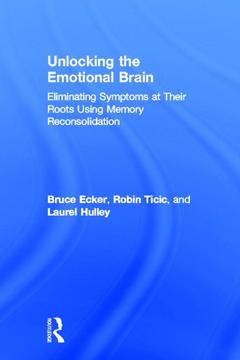Unlocking the Emotional Brain Eliminating Symptoms at Their Roots Using Memory Reconsolidation
Auteurs : Ecker Bruce, Ticic Robin, Hulley Laurel

Psychotherapy that regularly yields liberating, lasting change was, in the last century, a futuristic vision, but it has now become reality, thanks to a convergence of remarkable advances in clinical knowledge and brain science. In Unlocking the Emotional Brain, authors Ecker, Ticic and Hulley equip readers to carry out focused, empathic therapy using the process found by researchers to induce memory reconsolidation, the recently discovered and only known process for actually unlocking emotional memory at the synaptic level. Emotional memory's tenacity is the familiar bane of therapists, and researchers have long believed that emotional memory forms indelible learning. Reconsolidation has overturned these views. It allows new learning to erase, not just suppress, the deep, unconscious, intensely problematic emotional learnings that form during childhood or in later tribulations and generate most of the symptoms that bring people to therapy. Readers will learn methods that precisely eliminate unwanted, ingrained emotional responses?whether moods, behaviors or thought patterns?causing no loss of ordinary narrative memory, while restoring clients' well-being. Numerous case examples show the versatile use of this process in AEDP, Coherence Therapy, EFT, EMDR and IPNB.
Neimeyer, Foreword. Part I: Emotional Coherence: A Unified Framework of Behavioral, Emotional, and Synaptic Change. Maximizing Effectiveness and Satisfaction in Clinical Practice. Memory Reconsolidation: How the Brain Unlearns. The Focused, Deep Psychotherapy of Emotional Unlearning. Moments of Fundamental Change: Map and Methods. Emotional Coherence and the Great Attachment Debate. A Framework for Psychotherapy Integration. Part II: Coherence-Focused Therapy in Practice. Sibson, A Father’s Tormenting Guilt: Deep Resolution in Seven Coherence-Focused Sessions. Martignetti, Up On Top From Down Below: Cessation of Compulsive Drinking Using Coherence Therapy. Geoghegan, Bypassing Bypass Surgery: Using Emotional Coherence to Dispel Compulsive Eating. Connor: Hearing Hostile Voices: Ending Psychotic Symptoms at Their Coherent Roots. Glossary. References. The Authors. Online Supplements .
Bruce Ecker and Laurel Hulley are the originators of Coherence Therapy and coauthors of Depth Oriented Brief Therapy: How To Be Brief When You Were Trained To Be Deep – and Vice Versa, the Coherence Therapy Practice Manual and Training Guide, and the Manual of Juxtaposition Experiences: How to Create Transformational Change Using Disconfirming Knowledge in Coherence Therapy. Ecker is codirector of the Coherence Psychology Institute, has taught for many years in graduate programs, and has been in private practice near San Francisco since 1986. Hulley is director of education and paradigm development of the Coherence Psychology Institute and co-founder of the Julia Morgan Middle School for Girls in Oakland, California.
Robin Ticic is director of training and development of the Coherence Psychology Institute and is in private practice near Cologne, Germany, specializing in trauma therapy and clinical supervision of trauma therapists. She has served as a psychologist for the Psychotraumatology Institute of the University of Cologne for many years, provides a low-fee counseling service for parents, and is author of the parenting guide How to Connect With Your Child, published in English and German.
Date de parution : 10-2012
15.2x22.9 cm
Disponible chez l'éditeur (délai d'approvisionnement : 14 jours).
Prix indicatif 142,05 €
Ajouter au panierDate de parution : 10-2012
Ouvrage de 240 p.
15.2x22.9 cm
Thème d’Unlocking the Emotional Brain :
Mots-clés :
Psychotherapy integration; therapy; Psychotherapy unification; Mechanism of change; memory; reconsolidation; learning; Memory reconsolidation; Experiential psychotherapy; Transformational change; Coherence Therapy; Standard EMDR Protocol; Symptom Cessation; Juxtaposition Experience; USA’s Midwest; Emotional Implicit Memory; Kaiser Permanente Medical Center; Reparative Attachment; Disconfi Rmation; EMDR; Fi Rst Accident; Common Factors Theory; Symptom Deprivation; Emotional Learnings; Contradictory Knowledge; Clinical Practice; Transformation Sequence; Emotional Coherence; Bilateral Eye Movements; EMDR Protocol; Gastric Bypass Surgery; Fi Ve; Non-depressed Range; Sea Slugs; Target Constructs



